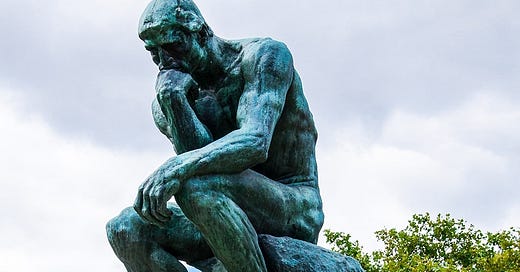Relatively recently, I started using a rhetorical device that I have fallen in love with. When I'm looking for an honest and fast assessment of something, I ask, "Scale of 1 to 10, what do you think?"
I did this last year when I asked my son, "Scale of 1 to 10, how much does your girlfriend like you?"
He considered for a moment and replied, "I guess 9 or 9.5."
I then asked, "Scale of 1 to 10, how much do you like her?"
He hesitated (which told me everything) and said, “I guess around 6.5.”
“So you know what you have to do, then,” I said.
“Yes,” he said, and within a few weeks had broken up with her.
I use my scale when friends recommend movies: “Scale of 1 to 10, what would you give The Teacher's Lounge?” The answer was “8” for its treatment of the issues faced by teachers but “7” as a film.
Or when I want a waiter to evaluate a dish: “Scale of 1 to 10, how good is the lasagne?” In Asia, lasagne is rarely better than a 7, which is why I almost never order it, but hope springs eternal.
A few months ago a friend told me he had been doing some work in Ukraine, and I asked, “Scale of 1-10, how safe/unsafe is it?” He said it was a 5.
I asked a colleague, “Scale of 1 to 10, how good is your spoken Chinese?” He laughed and said, “I wouldn’t choose myself.” I’m gonna give that a 3.
I’ve suggested this device to friends for use at work, or at home with their children. The beauty of it, I think, is that people are much less hesitant to offer an opinion if they are given the option of boiling down everything to a single number.
If I had asked my son, “How are things with your girlfriend?” he would very likely have said, “Fine.” But in 15 seconds, I had the complete story. Or at least as much of the story as I was interested in.
In restaurants, waiters seem to immediately understand that I’m not looking for bullshit when I ask for a numerical assessment of the lasagne, or the duck breast, or the fish and chips. I hate it when I ask, “What’s good?” and the answer is, “Oh, _____ is very popular.” Erm, I didn’t ask what’s popular; I asked what’s good. Scale of 1 to 10.
Similarly, in evaluating risk, I like the metric “non-zero”. As in, “Is there a non-zero chance I might be shot if I stand here?”
I asked myself that question several years ago, standing on a subway platform in Harlem on New Year’s Eve when a fight broke out on the opposite platform. It’s America, so obviously there is a non-zero chance of gunfire in just about every situation, and I moved slightly so my “center mass” was protected by one of the steel pillars that run along the platform’s edge. I noticed that the Central American woman standing next to me did the same.
As we watched (watchfulness is directly correlated to longevity in New York City), one of the guys being attacked on the opposite platform jumped down onto the tracks and ran over to our side, the main part of the fight rolled up one of the station exit tunnels, and soon enough, things were quiet again.
I looked at the woman, she looked at me, and I said, “Happy New Year.” She replied, “New York City.”
Other applications of “non-zero chance”:
Is there a non-zero chance that Putin’s Ukraine adventure will result in his downfall? Absolutely.
Is there a non-zero chance that Donald Trump will suffer a significant health issue before Election Day? Absolutely.
Is there a non-zero chance that President Biden will suffer a significant health issue during his second term in office? Absolutely.
Is there a non-zero chance that artificial intelligence will wipe out the human race? According to Elon Musk, that’s right. The chance is “not zero percent.” Musk said.
Scale of 1 to 10, how much would that suck?
I’m gonna give that a 10.




Hum, really very interesting ways to get a response: with the first you get a sincere opinion that otherwise you would not get, with the second a clear "yes" or "no". Next time I will ask these questions to the interviewer in any job interview, to know how the salary is, or the company culture, or the boss... ;)